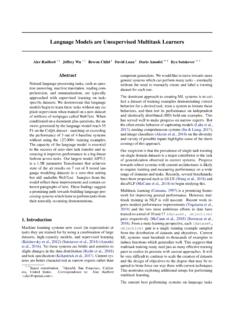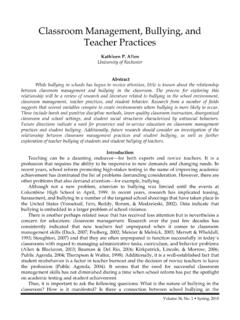Transcription of The Corporate Governance Lessons from the Financial Crisis
1 ISSN 1995-2864. Financial Market Trends OECD 2009. Pre-publication version for Vol. 2009/1. The Corporate Governance Lessons from the Financial Crisis *. Grant Kirkpatrick This report analyses the impact of failures and weaknesses in Corporate Governance on the Financial Crisis , including risk management systems and executive salaries. It concludes that the Financial Crisis can be to an important extent attributed to failures and weaknesses in Corporate Governance arrangements which did not serve their purpose to safeguard against excessive risk taking in a number of Financial services companies. Accounting standards and regulatory requirements have also proved insufficient in some areas. Last but not least, remuneration systems have in a number of cases not been closely related to the strategy and risk appetite of the company and its longer term interests.
2 The article also suggests that the importance of qualified board oversight and robust risk management is not limited to Financial institutions. The remuneration of boards and senior management also remains a highly controversial issue in many OECD countries. The current turmoil suggests a need for the OECD to re-examine the adequacy of its Corporate Governance principles in these key areas. *. This report is published on the responsibility of the OECD Steering Group on Corporate Governance which agreed the report on 11 February 2009. The Secretariat's draft report was prepared for the Steering Group by Grant Kirkpatrick under the supervision of Mats Isaksson. Financial MARKET TRENDS ISSN 1995-2864 - OECD 2008 1. THE Corporate Governance Lessons FROM THE Financial Crisis . Main conclusions The Financial Crisis can This article concludes that the Financial Crisis can be to an be to an important important extent attributed to failures and weaknesses in Corporate extent attributed to Governance arrangements.
3 When they were put to a test, Corporate failures and weaknesses Governance routines did not serve their purpose to safeguard against in Corporate Governance excessive risk taking in a number of Financial services companies. A. arrangements number of weaknesses have been apparent. The risk management systems have failed in many cases due to Corporate Governance procedures rather than the inadequacy of computer models alone: information about exposures in a number of cases did not reach the board and even senior levels of management, while risk management was often activity rather than enterprise-based. These are board responsibilities. In other cases, boards had approved strategy but then did not establish suitable metrics to monitor its implementation. Company disclosures about foreseeable risk factors and about the systems in place for monitoring and managing risk have also left a lot to be desired even though this is a key element of the Principles.
4 Accounting standards and regulatory requirements have also proved insufficient in some areas leading the relevant standard setters to undertake a review. Last but not least, remuneration systems have in a number of cases not been closely related to the strategy and risk appetite of the company and its longer term interests. Qualified board The Article also suggests that the importance of qualified board oversight and robust risk oversight, and robust risk management including reference to widely management is accepted standards is not limited to Financial institutions. It is also an important essential, but often neglected, Governance aspect in large, complex non- Financial companies. Potential weaknesses in board composition and competence have been apparent for some time and widely debated.
5 The remuneration of boards and senior management also remains a highly controversial issue in many OECD countries. The OECD Corporate The current turmoil suggests a need for the OECD, through the Governance Principles in Steering Group on Corporate Governance , to re-examine the adequacy these key areas need to of its Corporate Governance principles in these key areas in order to be reviewed judge whether additional guidance and/or clarification is needed. In some cases, implementation might be lacking and documentation about the existing situation and the likely causes would be important. There might also be a need to revise some advice and examples contained in the OECD Methodology for Assessing the Implementation of the OECD. Principles of Corporate Governance . 2 Financial MARKET TRENDS ISSN 1995-2864 OECD 2009.
6 THE Corporate Governance Lessons FROM THE Financial Crisis . I. Introduction Corporate Governance The development and refinement of Corporate Governance enhancements often standards has often followed the occurrence of Corporate Governance followed failures that failures that have highlighted areas of particular concern. The burst of highlighted areas of the high tech bubble in the late 1990s pointed to severe conflicts of particular concern interest by brokers and analysts, underpinning the introduction of principle covering the provision of advice and analysis into the Principles. The Enron/Worldcom failures pointed to issues with respect to auditor and audit committee independence and to deficiencies in accounting standards now covered by principles , , The approach was not that these were problems associated with energy traders or telecommunications firms, but that they were systemic.
7 The Parmalat and Ahold cases in Europe also provided important Corporate Governance Lessons leading to actions by international regulatory institutions such as IOSCO and by national authorities. In the above cases, Corporate Governance deficiencies may not have been causal in a strict sense. Rather, they facilitated or did not prevent practices that resulted in poor performance. It is therefore natural for The current turmoil in Financial institutions is sometimes described the Steering Group to as the most serious Financial Crisis since the Great Depression. It is examine the situation in therefore natural for the Steering Group to examine the situation in the the banking sector and banking sector and assess the main Lessons for Corporate Governance in assess the main Lessons general.
8 This article points to significant failures of risk management for Corporate Governance 1. systems in some major Financial institutions made worse by incentive in general systems that encouraged and rewarded high levels of risk taking. Since reviewing and guiding risk policy is a key function of the board, these deficiencies point to ineffective board oversight (principle ). These concerns are also relevant for non- Financial companies. In addition, disclosure and accounting standards (principle ) and the credit rating process (principle ) have also contributed to poor Corporate Governance outcomes in the Financial services sector, although they may be of lesser relevance for other companies. The article examines The first part of the article presents a thumbnail sketch of the macroeconomic and macroeconomic and structural conditions that confronted banks and structural conditions their Corporate Governance arrangements in the years leading up to and shortcomings in 2007/2008.
9 The second part draws together what is known from Corporate Governance at company investigations, parliamentary enquiries and international and the company level other regulatory reports about Corporate Governance issues at the company level which were closely related to how they handled the situation. It first examines shortcomings in risk management and incentive structures, and then considers the responsibility of the board and why its oversight appears to have failed in a number of cases. Other aspects of the Corporate Governance framework that contributed to the failures are discussed in the third section. They include credit rating agencies, accounting standards and regulatory issues. Financial MARKET TRENDS ISSN 1995-2864 - OECD 2009 3. THE Corporate Governance Lessons FROM THE Financial Crisis .
10 II. Background to the present situation Crisis in the subprime By mid 2008, it was clear that the Crisis in the subprime market in market in the US, and the US, and the associated liquidity squeeze, was having a major impact the associated liquidity on Financial institutions and banks in many countries. Bear Stearns had squeeze, was having a been taken over by JPMorgan with the support of the Federal Reserve major impact on Bank of New York, and Financial institutions in both the US ( Financial institutions Citibank, Merrill Lynch) and in Europe (UBS, Credit Suisse, RBS, HBOS, and banks in many Barclays, Fortis, Soci t G n rale) were continuing to raise a significant countries volume of additional capital to finance, inter alia, major realised losses on assets, diluting in a number of cases existing shareholders.











